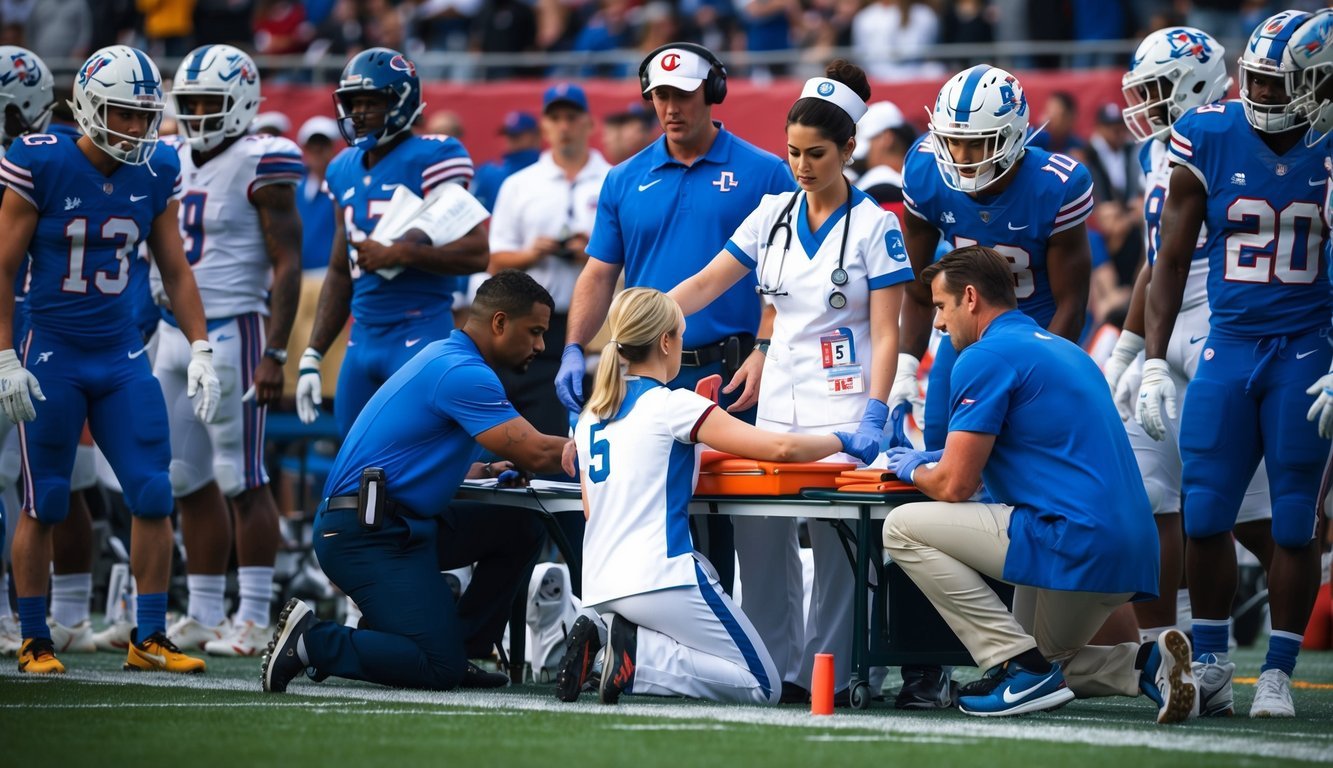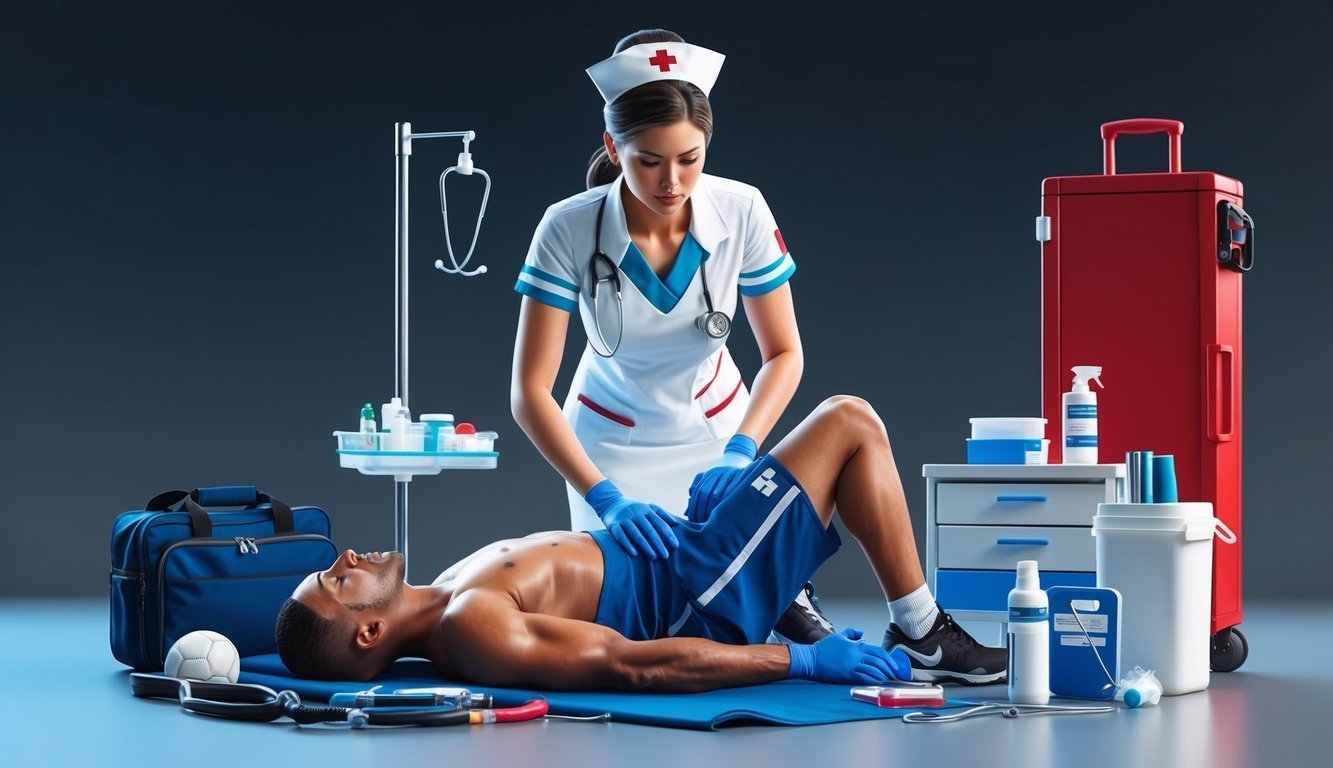A sports medicine nurse plays a vital role in helping athletes recover from injuries and maintain peak performance. They assess injuries, provide treatment, and offer guidance on injury prevention for active individuals. These nurses work closely with athletes, coaches, and other healthcare professionals.
To become a sports medicine nurse, you need a solid educational background in nursing along with specialized training in sports-related health issues.
This combination allows you to better understand common injuries and the best practices for treatment.
By engaging in clinical experiences, you also learn the dynamics of working in team environments, making you an essential part of any sports setting.
Career prospects in sports medicine continue to grow, as more people become aware of the importance of sports health and wellness.
With the right qualifications, you can take advantage of various opportunities in clinics, schools, and professional sports teams.
Key Takeaways
- Sports medicine nurses specialize in treating and preventing sports-related injuries.
- A nursing degree and specialized training are essential for this career.
- There are many career opportunities available in sports medicine.
Roles and Responsibilities of Sports Medicine Nurses
Sports medicine nurses play a vital role in supporting athletes and managing sports-related injuries.
Their responsibilities include injury prevention, care coordination, and fostering communication within healthcare teams.
This section outlines these key areas of their work.
Injury Prevention and Management
Injury prevention is a main focus for sports medicine nurses.
You help athletes understand how to avoid injuries by teaching them proper techniques and encouraging strength training.
Your role often includes creating personalized preventive care plans tailored to each athlete’s needs.
When injuries occur, you are involved in assessing and managing them.
You monitor the severity of injuries, assist in treatment plans, and help develop rehabilitation strategies to ensure athletes recover safely and effectively.
Care Coordination with Healthcare Professionals
As a sports medicine nurse, you act as a crucial link between athletes and other healthcare professionals.
Your role involves coordinating care with doctors, physical therapists, and specialists.
You ensure everyone is informed about the athlete’s condition and treatment plan.
This collaboration helps in forming comprehensive care strategies that improve recovery outcomes.
Regular communication with the healthcare team allows you to make necessary adjustments to treatment plans, ensuring athletes receive the best possible care.
Communication and Teamwork in Sports Settings
Effective communication and teamwork are essential in sports medicine.
You work closely with coaches, trainers, and other healthcare staff to promote athletes’ health.
You share vital information about injuries and recovery processes to keep everyone aligned.
Your ability to communicate clearly and foster strong teamwork improves both injury management and preventive measures.
By building supportive relationships within the team, you help create a safe environment for athletes to excel in their sports.
Educational Pathway and Clinical Experience

To become a sports medicine nurse, a strong educational foundation and hands-on clinical experience are essential.
This journey requires you to gain specific nursing qualifications along with specialized training in sports medicine.
Nursing Degree and Specialized Training
You need a minimum of an associate’s degree in nursing to start your career.
Most employers prefer a Bachelor of Science in Nursing (BSN).
After obtaining your degree, you must pass the NCLEX-RN exam to become a Registered Nurse.
After achieving your RN license, consider focusing on sports medicine by gaining experience in settings like orthopedic clinics or sports teams.
This hands-on experience is crucial for understanding athletic injuries and recovery processes.
Additionally, pursuing coursework related to sports medicine can enhance your knowledge in this area.
Sports Medicine Fellowship and Certification
To further specialize, you can pursue a sports medicine fellowship.
This program typically lasts 12 months and provides intensive training in caring for athletes.
You will learn about injury prevention, rehabilitation techniques, and sport-specific care.
Certification as an athletic trainer (ATC) can also be beneficial.
Earning this certification requires passing an exam from the Board of Certification.
Besides practical skills, you’ll gain knowledge on performance enhancement and rehabilitation strategies.
These credentials can greatly enhance your career prospects in sports medicine nursing.
Common Sports Injuries and Treatments

In sports medicine, understanding common injuries is crucial for effective treatment and recovery.
You may encounter various injuries, including musculoskeletal injuries that require orthopedic care, as well as the need for rehabilitation and physical therapy.
Here is a closer look at these areas.
Musculoskeletal Injuries and Orthopedic Care
Musculoskeletal injuries involve damage to muscles, bones, ligaments, and tendons.
Common types include:
- Torn Ligaments: Often caused by sudden twists or impacts, these injuries require careful diagnosis and rehabilitation.
- Bone Fractures: These can occur from falls or high-impact activities. Fractures may require immobilization or surgery, depending on their severity.
- Dislocations: A dislocation happens when bones in a joint become displaced, requiring immediate medical attention to prevent long-term damage.
- Muscle Strains: Strains occur when muscles are stretched too far and tear, leading to pain and swelling.
Orthopedic specialists play a key role in diagnosing and treating these injuries.
They may recommend imaging tests like X-rays or MRIs, and create tailored treatment plans for recovery.
Rehabilitation and Physical Therapy Integration
Rehabilitation is essential for restoring function after injuries.
It typically involves physical therapy, which helps you regain strength, flexibility, and mobility.
Common practices in rehabilitation include:
- Strengthening Exercises: These target the injured area to rebuild strength.
- Range of Motion Activities: These help restore movement and prevent stiffness.
- Manual Therapy: Techniques used by therapists to relieve pain and improve function.
Rehabilitation facilities provide structured programs to guide recovery.
Consistent treatment is vital, as it can prevent re-injury and promote long-term health.
Collaborating with your healthcare team ensures a focused approach to your recovery.
The Sports Medicine Nurse in Team Environments

In a team setting, sports medicine nurses play a vital role.
They support athletes during training and recovery.
Their collaboration with other professionals ensures safe and effective care for the team’s health.
Working with Sports Teams and Professional Athletes
As a sports medicine nurse, you work closely with sports teams and professional athletes.
Your main focus is on injury prevention and management.
You monitor athletes’ health and provide immediate care when injuries occur.
You may conduct assessments and keep detailed health records.
This ensures that athletes receive tailored treatment plans.
Your role often includes educating athletes about proper nutrition, hydration, and recovery techniques.
Additionally, you act as a liaison between athletes and medical staff.
Building trust with the team is crucial.
When athletes feel secure, they are more likely to share their concerns.
This openness leads to better health outcomes.
Collaboration with Physical Therapists and Other Support Staff
In a team environment, collaboration is essential.
You partner with physical therapists and other medical staff to optimize care.
Together, you create comprehensive rehabilitation plans for injured athletes.
Meetings often involve discussing progress and adjusting treatment plans.
This teamwork helps ensure athletes regain their strength and flexibility. Regular communication is key to addressing any setbacks.
You also assist in coordinating schedules for physical therapy sessions and track recovery goals.
This helps keep everyone informed about the athlete’s status.
The combined efforts of the sports medicine nurse and physical therapists promote quicker, safer recoveries.
Career Prospects and Professional Development

In the field of sports medicine nursing, there are significant opportunities for career growth and development.
Understanding how to advance in this specialty and knowing what to expect in terms of salary and job outlook can guide your career decisions.
Advancing in Sports Medicine Nursing
To advance in your career as a sports medicine nurse, consider pursuing additional certifications, such as becoming a sports medicine nurse practitioner.
This role allows you to take on more responsibilities, including diagnosis and treatment plans.
You might look into specialized programs or continuing education courses focused on areas like orthopedic care.
Networking with professionals in the field can also provide mentorship opportunities.
Additionally, working in diverse settings—like hospitals, universities, or professional sports teams—can broaden your experience and open up new pathways for advancement.
Salary Expectations and Job Market Outlook
Salaries for sports medicine nurses can vary based on experience and location.
Typically, a sports medicine nurse with five to nine years of experience can earn around $102,300 annually, which is about $8,530 per month.
As you gain more experience, salaries can increase significantly.
For example, those with ten to nineteen years of experience may see earnings of about $127,340 per year, translating to roughly $10,610 monthly.
The job market for sports medicine professionals remains strong.
As awareness of sports-related injuries grows, demand for these specialized nurses is likely to increase.
For more information on salaries and job outlooks, visit NursingProcess.org and Indeed.com.
Frequently Asked Questions
This section addresses important questions about becoming a sports medicine nurse.
It covers educational paths, salary expectations, certifications, work environments, responsibilities, and career opportunities with professional sports teams.
What are the educational requirements for becoming a sports medicine nurse?
To become a sports medicine nurse, you need to start with a minimum of a bachelor’s degree in nursing.
After earning your practical nursing diploma, you can pursue a registered nursing (RN) degree in about two years.
What is the average salary range for a sports medicine nurse?
The salary of a sports medicine nurse can vary based on experience.
A nurse with five to nine years of experience may earn around $102,300 annually.
With ten to nineteen years, the salary could increase to about $127,340 per year.
What certifications are necessary for a career in sports medicine nursing?
While specific certifications can vary, pursuing certifications in sports medicine or related fields is beneficial.
Common certifications include the Certified Sports Nurse (CSN) and other specialty nursing credentials.
In what kind of settings do sports medicine nurses typically find employment?
Sports medicine nurses often work in various settings, including hospitals, clinics, universities, and athletic organizations.
They may also find roles with professional sports teams or wellness centers focused on sports injuries.
What are the common responsibilities of a sports medicine nurse?
Responsibilities include assessing and treating injuries, assisting in rehabilitation, and educating athletes about injury prevention.
They also collaborate with other medical professionals to provide comprehensive care to athletes.
How can a nurse pursue a career with a professional sports team such as the NFL or NBA?
To work with a professional sports team, you should gain relevant experience in sports medicine.
Networking, internships, and specialized training can help increase your chances.
Joining professional organizations in sports nursing may also provide valuable contacts and job opportunities.

